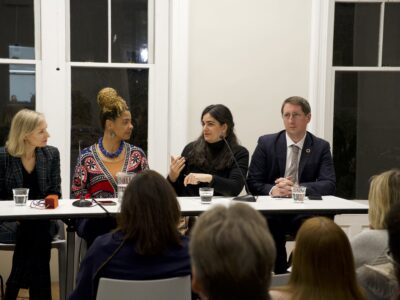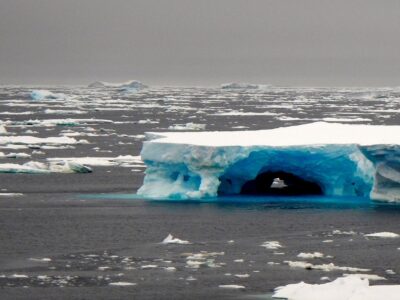Q&A with Akong Charles Ndika, M.A. in Climate and Society Alumnus
Akong Charles Ndika was a student in the first Climate and Society class to graduate in 2005. Prior to beginning the Climate and Society program, Ndika worked as an environmental and energy policy journalist and activist with Global Village, and NGO in his home country of Cameroon.
Today, Akong is the lead international consultant for UNDP’s Regional Programme for Poverty Reduction in West Africa. In the Q/A below, Ndika answers some questions about his experience in the Climate and Society program and how the skills he learned at Columbia University are helping him in his career.
Climate and Society Program Office: How did you hear about the Climate and Society program? What made you interested in the program?
Akong Charles Ndika: After working as a climate change campaigner and energy policy analyst, I felt the need to upgrade my understanding of climate issues. After stumbling on the website, I was thrilled by multidisciplinary focus of the program. The significant percentage of courses allocated to electives, provided the opportunity to deepen my understanding of policy-making.
Climate and Society Program Office: Describe your experience as a Climate and Society student, what did you learn? Did you have a particular focus?
Akong Charles Ndika: None of my academic experiences rivals that of the Climate and Society program. The multidisciplinary focus of the program empowered me to think horizontally, looking at climate variability and change as cross-cutting problems, that transcend environment, economy, politics and culture. By equipping me with skills and tools to manage uncertainties and risks involved in making climate-informed decisions, I was able to think vertically about the dynamics of the climate system, particularly how to generate and customize forecasts information to local, regional and global scales of interventions. Employing environmental predictors in climate models deepened my insights of climate-environment nexus and also equipped me with cutting-edge quantitative skills.
The emphasis on vulnerability and adaptation, particularly the impacts of climate on development and poverty alleviation, provided me with a nexus into the world of policy-making. Threading the program is the challenge to conventional development planning that assumes underlying climate regimes as given, not amenable to plan intervention. Yet, events like hurricane Katrina and prolonged droughts in the horn of Africa continue to expose the limits of advantaging climatology over variability in infrastructure development. Thanks to the program, I am able to think of climate variability and change not only as risks, but also as opportunities, which with useful and usable forecasts information, they could be maximized by society for sustainable development. With an interest in public policy, I elected 50 percent of my courses from the School of International and Public Affairs (SIPA).
CSPO: Please tell me more about your research assistantship and internship/thesis.
ACN: The summer internship had a transforming impact on my world. Interning for UNDP Energy and Environment Group, New York, I co-authored a published 113-page global report analyzing the nexus of energy and poverty in Poverty Reduction Strategy Papers (PRSPs). Because of the strong analytical skills I developed in program, I was able to win the confidence of my supervisor. The report analyses the extent to which access to modern energy services have been factored into national development strategies for alleviating poverty and achieving the Millennium Development Goals (MDGs). At the end of the internship, I continued working on the report as a consultant.
CSPO: What work are you doing now? Are you applying the skills that you learned in the CS program at your current job?
ACN: At the end of the internship, I was elected on to the board of Global Village Energy Partnership (GVEP), a multistakeholder partnership, launched during the World Summit on Sustainable Development (WSSD) to facilitate the delivery of modern energy services to over one billion underserved and un-served populations of the world. As one of the 15 members on the advisory board, I am able to employ the excellent skills I acquired in policy analysis. Presently, I have been recruited as an International Consultant for the UNDP Regional Program on Poverty Reduction, West Africa.
CSPO: What are your plans for the future?
ACN: I intend to continue working as a policy analyst, focusing on climate-energy- poverty nexus, and environmental governance.
CSPO: Would you recommend the CS program to others? Why?
ACN: I won’t hesitate to recommend the program to any one who plans on taking a career in development policy and planning.
CSPO: What is the reaction when you tell friends/family you are working on issues of climate change?
ACN: Due to the breadth and depth of my knowledge of climate issues, I have been able to marvel colleagues and friends in appraising controversial issues surrounding climate change.
CSPO: Do you have trouble getting them to understand what the issues are?
ACN: Sometimes, I do encounter difficulties in making them to understand the differences between natural climate variability and anthropogenic climate change. There is a common misconception by the media to attribute any anomalous climatic events to climate change. Making the distinction between correlation and causation has enhanced my credibility in presenting climate information. Being able to understand the language of climate scientists and the language of politicians has been so far my greatest assets. I am able to communicate effectively to multistakeholders.
CSPO: Do you think they have the right amount of information about the issue? if not, what do you think can be done to help that? Are there some common misconceptions?
ACN: I think there is a growing disconnect between politicians and climate scientists. The ‘360-degree’ training of the program, adequately prepares graduates to bridge the two worlds.
About The Climate and Society Program
Columbia University’s 12-month MA Program in Climate and Society is in its third year of training professionals who are able to understand the links between climate change and its impacts on society. Sponsored jointly by The Earth Institute at Columbia University and the Graduate School of Arts and Sciences, this unique program offers a set of tailor-made core courses which provide a scientific basis for inquiry and stress interdisciplinary problem solving.
Drawing on the superb educational and research facilities of Columbia University, the M.A. Program in Climate and Society combines elements of established programs in earth sciences, earth engineering, international relations, political science, sociology, and economics with unique classes in interdisciplinary applications specially designed for the program’s students. To date, the program has graduated 34 students from all over the world including Australia, Bolivia, Cameroon, Canada, China, Colombia, Ethiopia, Ghana, Guyana, India, Lesotho, Palestine, Philippines, Sri Lanka, Switzerland, Zimbabwe, and the US.
For more information, please visit our website at http://climatesociety.ei.columbia.edu or email climatesociety@ei.columbia.edu



